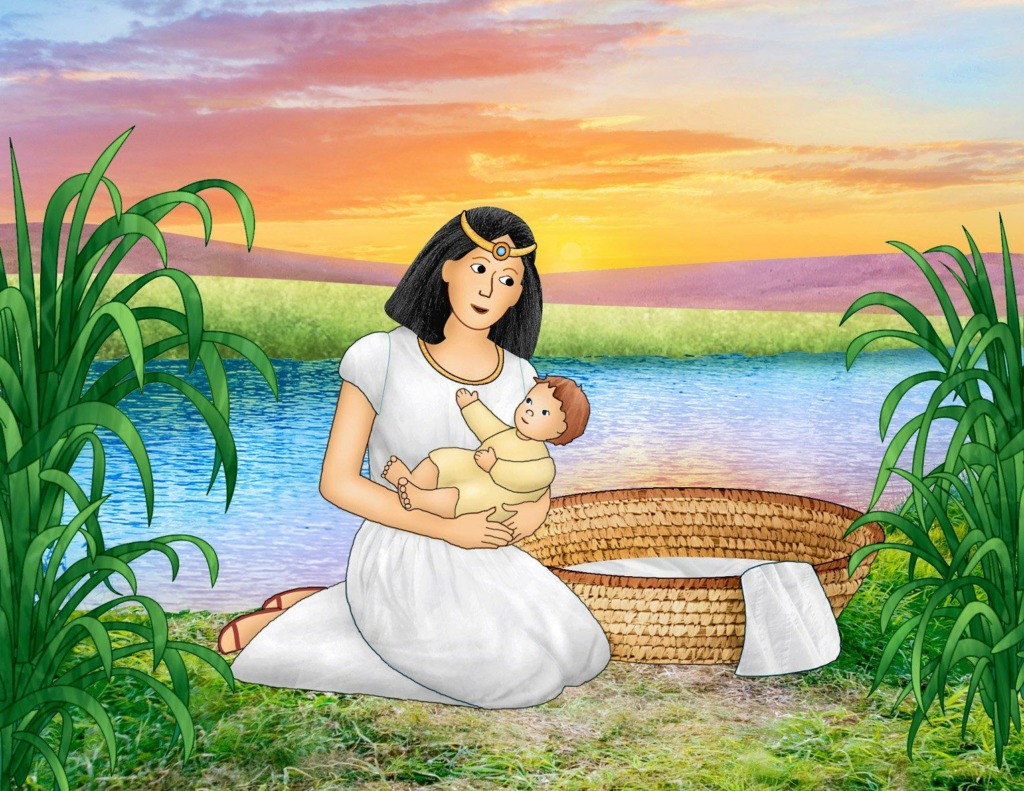CHILDREN’S STORY:
Ten of Jacob’s 12 sons were jealous of their brother, Joseph, so they sold him into slavery in Egypt. But God was with Joseph, who eventually came to work for Pharaoh and ruled all of Egypt for him.
When there was a terrible drought, some of Jacob’s sons went to Egypt to find food and reunited with Joseph. Jacob and the rest of his family moved to Egypt, where they had a good life because of Joseph.
As time went by, Jacob’s descendants greatly multiplied. Eventually, their good life turned bad when a new Pharaoh who had not known Joseph came into power. He did not look favorably upon the Israelites, so he enslaved them and ordered all of their male babies killed.
During this time, a Levite woman had a baby boy, and she hid him for three months. When she could no longer hide him, she took a papyrus basket, coated it with bitumen and pitch, put the baby in the basket and placed it among the reeds on the bank of the Nile River.
The baby’s sister stationed herself at a distance so she could see what happened to her brother.
Just then, Pharaoh’s daughter came to the river to bathe. She noticed the basket among the reeds and told her handmaid to retrieve it.
Pharaoh’s daughter opened the basket and looked in. She was surprised to find a crying baby inside.
“It is one of the Hebrews’ children,” she said with pity.
The baby’s sister saw what was happening, so she went up to Pharaoh’s daughter.
“Shall I go and call one of the Hebrew women to nurse the child for you?” she asked.
“Yes, do so,” Pharaoh’s daughter said.
The girl went home and brought back her mother, who also was the baby’s mother.
“Take this child and nurse it for me, and I will repay you,” Pharaoh’s daughter told the baby’s mother.
The woman took the baby and nursed him.
When the child grew and no longer needed to be nursed, the woman brought him to Pharaoh’s daughter, who adopted him.
Pharaoh’s daughter decided to name the child Moses because she drew him out of the water.
READ MORE ABOUT IT:
Exodus 1 & 2
Q&A
1. Who drew the basket out of the water?
2. What name was the baby given?
ESSAY: When have you seen something that was wrong and tried to make it right?
BIBLE ACCENT:
Even though Moses had been adopted by Pharaoh’s daughter and was raised as an Egyptian, Pharaoh eventually sought his death.
In Exodus 2:11, we read that when Moses grew up, he went out to see his kinsmen the Hebrews and witnessed their forced labor. When he noticed an Egyptian striking a Hebrew, he slew that Egyptian and hid him in the sand.
When Pharaoh heard what had happened, he wanted to kill Moses. Moses fled to the land of Midian, where he sat down by a well.
The priest of Midian had seven daughters who used the well to water their father’s flock. They came to the well when Moses was there, but some shepherds drove them away.
Moses defended the daughters and helped them water their flock.
When the daughters returned to their father, Reuel, he was surprised by how quickly they had accomplished their task.
“An Egyptian delivered us from the shepherds. He even drew water for us and watered the flock!” the daughters said.
“Where is he?” he asked his daughters. “Why did you leave the man there? Invite him to have something to eat.”
Moses accepted Reuel’s invitation and agreed to stay with him. Reuel then gave Moses his daughter Zipporah in marriage.
SPOTLIGHT ON THE SAINTS:
St. Kunigunde of Poland
St. Kunigunde, or Kinga, was born in 1224 and was the daughter of Hungarian royalty. At age 16, she married King Boleslaus IV of Poland.
Kunigunde and her husband ruled together for 40 years. She was very generous, and she helped the poor and sick, supported the Friars Minor and ransomed Christian prisoners.
After she was widowed, she entered a Poor Clares convent that she had founded in southern Poland.
She died in 1292, and we remember her on July 24.
PUZZLE:
Unscramble the words and arrange them in the correct order to form a quotation from the children’s story.
noe, denchril, ti, websher, fo, si, het
Answers: one; children; it; Hebrews; of; is; the
It is one of the Hebrews’ children.

